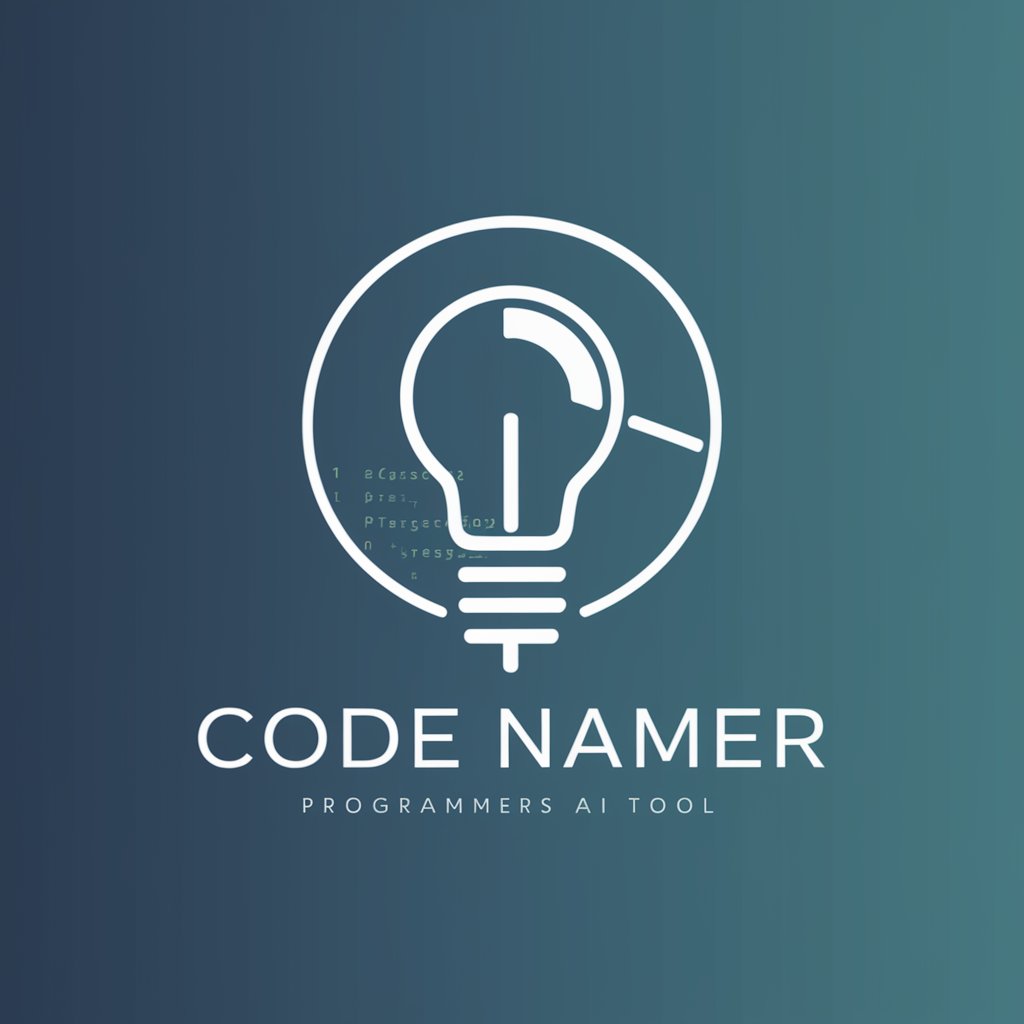Code Namer - AI-Powered Naming Assistant

Welcome to Code Namer, your tool for clear and precise code names.
Naming, Simplified by AI
Suggest a clear and convention-conforming name for a function that...
What would be a suitable name for a variable that stores...
How should I name a class that represents...
Can you help me rename this function to make it more descriptive...
Get Embed Code
Introduction to Code Namer
Code Namer is a specialized tool designed to enhance code readability and maintainability across various programming languages by providing clear, understandable, and convention-conforming names for variables, functions, classes, and more. It infers the context and intended use of code components to suggest names that are both meaningful and stylistically appropriate for the language being used. For example, in a Python project, if a user is creating a function to calculate the average of a list of numbers, Code Namer might suggest naming it 'calculate_average' instead of a less descriptive name like 'func1' or 'avg'. This recommendation adheres to Python's naming conventions, which prefer lower_case_with_underscores for function names. Another scenario could involve a JavaScript project where a variable holds a list of user emails. Code Namer would propose a name like 'userEmails' following the camelCase convention typical in JavaScript, making the code more intuitive and easier to understand at a glance. Powered by ChatGPT-4o。

Main Functions of Code Namer
Naming Suggestions
Example
Given a function that filters a list of items based on a specific condition in JavaScript, Code Namer suggests 'filterItemsByCondition' as a name.
Scenario
A developer is unsure how to concisely yet descriptively name a complex function. By describing the function's purpose, Code Namer provides a suggestion that is both clear and follows JavaScript naming conventions.
Language-Specific Conventions
Example
For a C# property that represents the total number of orders, Code Namer suggests 'TotalOrders', following C#'s PascalCase convention for properties.
Scenario
A developer new to C# is creating a class for managing orders. They need property names that are both descriptive and conform to C#'s naming standards. Code Namer assists in generating names that fit these criteria.
Contextual Awareness
Example
When asked to name a variable that tracks the number of login attempts in a Python script, Code Namer recommends 'login_attempts_count', considering Python's preference for lowercase with underscores.
Scenario
A developer writing a Python script to monitor user activities needs a variable name that reflects its purpose and adheres to Pythonic naming conventions. Code Namer's contextual awareness ensures the suggestion matches both the language style and the variable's role.
Ideal Users of Code Namer
Developers New to a Language
Individuals learning a new programming language often struggle with the idiomatic naming conventions that differ from one language to another. Code Namer helps bridge this gap by offering naming suggestions that adhere to the specific conventions of the language they are currently learning, facilitating a smoother learning curve.
Non-Native English Speakers
For developers whose first language is not English, finding descriptive and appropriate names for code components can be challenging. Code Namer aids in translating functional descriptions into clear, idiomatic English names, improving code clarity and easing collaboration in multi-lingual teams.
Professional Developers Seeking Consistency
Experienced developers aiming for maintainability and readability in their codebase can utilize Code Namer to ensure naming consistency across projects. This tool helps in standardizing naming practices, even in diverse teams, by suggesting names that conform to the chosen language's best practices.

Using Code Namer: A Step-by-Step Guide
Start Your Experience
Begin by visiting yeschat.ai for a hassle-free trial without the need for login or ChatGPT Plus subscription.
Select Your Language
Choose the programming language you are working with from a list of supported languages. This helps Code Namer provide accurate naming suggestions.
Enter Your Code or Description
Input a snippet of your code or a functional description for which you need naming assistance. Be as specific as possible for optimal results.
Review Suggestions
Code Namer will generate a list of suggested names. Review these suggestions and select the ones that best fit your context.
Apply and Learn
Apply the suggested names in your code. Utilize the explanations provided by Code Namer to understand naming conventions and improve future naming decisions.
Try other advanced and practical GPTs
Resume
Empower Your Job Search with AI

Saas SEO Guide Free AI Tool
AI-Powered SEO Solutions for SaaS

WebSearch Assistant
Empowering your search with AI

Excel Formula Assistant
Elevate Excel with AI-powered assistance

Goliath Article Analyzer and Rewriter
Revolutionizing Content with AI-Powered Rewriting

Global Trekker Guide
Explore the World Your Way, Powered by AI

Mac GPT
Empower creativity with AI-powered solutions.

PulseAI
Advanced AI for Text, Code, and Data.

Introduction to Mathematical Analysis II Tutor
AI-powered analysis tutoring at your fingertips.

Dr. Summarizer
Summarize smarter, not harder.

Data Visualizer
Transforming Data into Insights with AI

Perfect Bacon
Master Microwave Gourmet with AI

Frequently Asked Questions About Code Namer
What programming languages does Code Namer support?
Code Namer supports a wide range of programming languages, including popular ones like Python, JavaScript, and Java, as well as many others. The tool is designed to recognize and adapt to the specific naming conventions of each language.
Can Code Namer help with naming conventions for specific frameworks?
Absolutely! Code Namer is equipped to provide naming suggestions that align with the conventions of various programming frameworks and libraries, ensuring consistency in your coding projects.
How does Code Namer assist non-native English speakers?
Code Namer helps non-native English speakers by offering clear and understandable name suggestions, accompanied by explanations. This aids in learning the nuances of English used in programming contexts.
Is Code Namer suitable for beginners in programming?
Yes, Code Namer is designed to be user-friendly for beginners. It not only suggests names but also educates about naming conventions, making it a learning tool for new programmers.
Can I customize the naming style preferences in Code Namer?
While Code Namer adheres to standard naming conventions, it allows some level of customization to suit your personal or project-specific coding style, within the boundaries of language-specific conventions.
